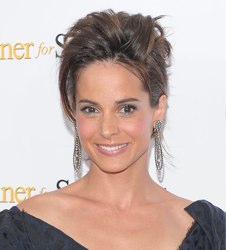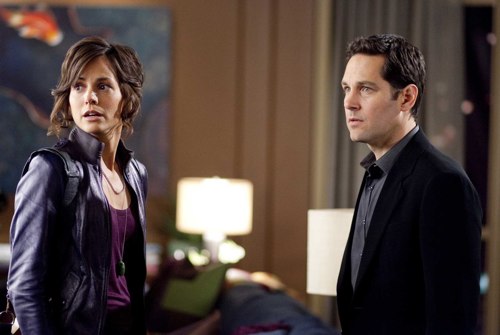
Still, the French-born actress is a fortuitous fit for the role of Rudd's onscreen girlfriend, giving a dash of Gallic flavor to a film adapted from Francis Veber's 1998 French import The Dinner Game. She told Movieline about the unlikely circumstances that scored her the role, and how she made her way to Hollywood via fashion.
Jay Roach told me that when you booked this role, everyone in town was calling him to find out who you were. Did you feel that sudden wave of attention?
No! [Laughs] I did not know that!
There were lots of well-known actresses who were up for the role. How did you get into the mix?
I live in New York, and I had just changed managers and agents, and maybe a month after that, I went to LA to do meetings. Two days before I left, I got an email saying, "You're going to audition for this movie based on Le dîner de cons." And I went, "Oh, I know this movie! I love this movie!" I went to see the casting director, and she spent an hour with me. I thought, "This is strange." [Laughs]
That's certainly not typical.
Two days later I read with Jay and the producers and went back to New York, and then I had to go back to LA three days later to read in front of Jay and the producers again. A week later, I read with Paul.
It's a good thing to have the casting director in your corner from the start.
Yeah, it's never happened to me! We did all three scenes, and she kept giving me [notes], like, "Do it like this. Now like this." I don't know! It was like, "Wow, this is amazing."
Were you worried they would pick a more recognizable actress, or were you even cognizant of who else was up for the role?
No, I knew that -- they told me -- but it was my first big audition for a big role like this in a big commercial movie. I just thought that I needed to give it my all and my goal was to leave the room and just be happy with what I did, because whatever would happen would happen. I've done this before where it went down to two girls and I didn't get it, so I had that in the back of my mind, too. I thought, "Chances are, I'll hear the same thing with the name and all that." I mean, I was very nervous.
What do you mean, "With the name"?
That they'd say, "Oh, well we loved you, but they really wanted to have a name." [Laughs]
There are a couple changes that the American version has made to the French original -- namely, the leads are more sympathetic. Are French audiences more willing to tolerate main characters who don't always do the right thing?
I don't know, because it's so outrageous -- all the circumstances are so ridiculous that you don't have time to think about it. I do remember watching the French one when it came out and thinking, "This could never be an American movie!" It's so cruel -- which made it very funny -- but I thought it would never work. In the American movie, you like Paul Rudd's character, and in the French movie, he's really an a**hole. That's a big difference.
It's interesting that Jay is so drawn to these out-of-control comedic situations in his films, and yet he's so calm and centered himself.
He is. He's very sweet with everybody, the crew and all the departments. He knew exactly how to talk to me: He'd just come quietly and say a couple of things, and then, boom. I feel very lucky that this is my first big film and he was the director, because he's really amazing.
For comedy purposes, you're even more of a straight man in this movie than Paul is. When was it hardest to keep composed?
When Steve Carell and Jemaine [Clement] are together! The scene near the end of the movie where they say bye to each other, they started improvising this thing where they put their hands on each other faces, and that was very hard to keep a straight face during. Jemaine and I have a scene with goats, and I never knew what he was doing behind me. Every time I turned around, I would go, "Oh my God!"
You used to work for Chanel. How did you get from there to here?
I just realized I didn't want to be in the corporate world anymore. Kind of chance, I got involved with the possibility of going into the modeling world, and I thought, "OK, I'll do that, and then I'll figure out what it is I want to do." Then I took an acting class, and I remembered thinking, "Oh my God, this is it. This is what I want to do." I started studying, and I threw everything out the window and started over.
When you worked in fashion, did you find people there to be as cutthroat as Meryl Streep's character in The Devil Wears Prada?
Yes. [Laughs] Yes, yes.
Is Hollywood even more cutthroat?
No, no. From my experience, it's different. People in fashion treat it as a business...I guess Hollywood is a business too, but you talk about story, you talk about a more artistic world than in fashion. It's more real, and it sounds so weird when I say that, because it's the opposite of what you hear, but so far, I love it!
[Photo Credit: Michael Loccisano/Getty Images]
